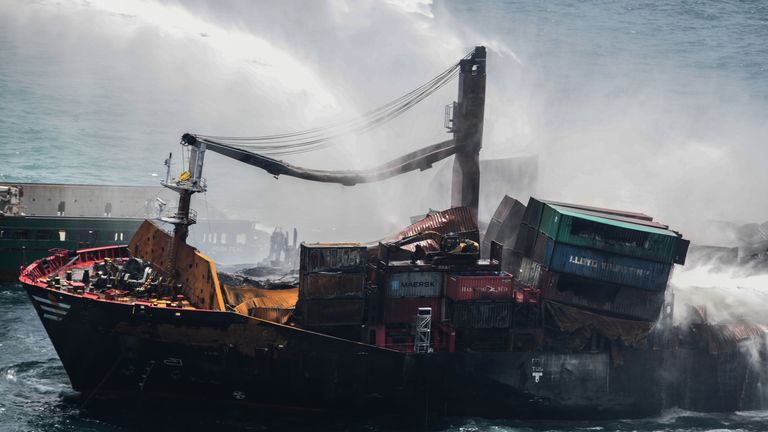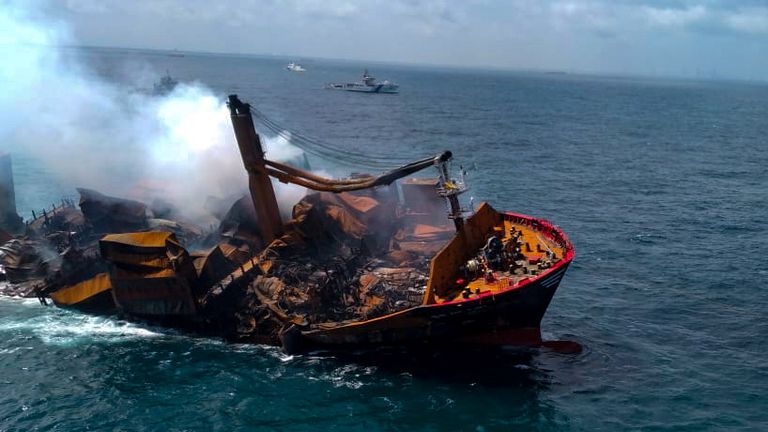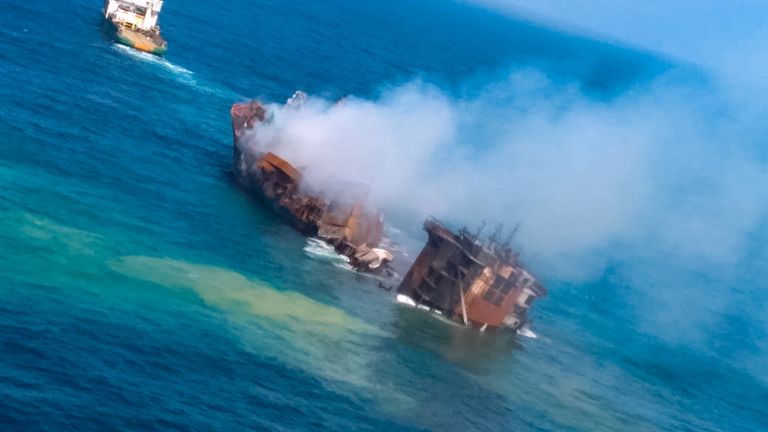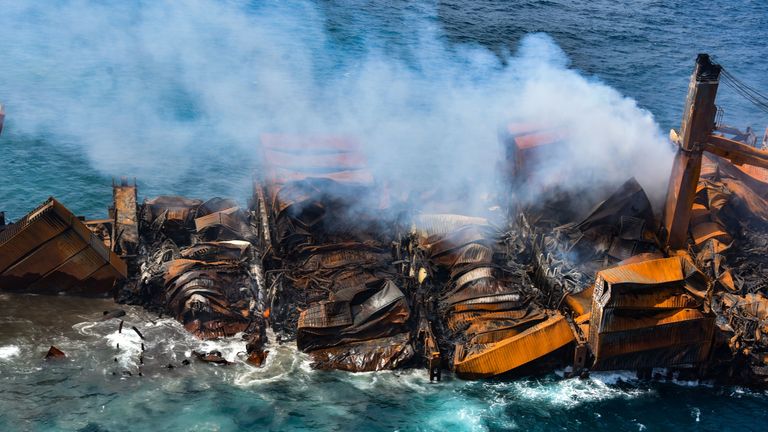The vessel was carrying 1,486 containers, including 25 tonnes of nitric acid and other chemicals, when it caught fire.
Amar Mehta
News reporter @Amarjournalist_
SKY NEWS
Wednesday 2 June 2021
SRI LANKA
Blazing Sri Lanka cargo ship 'sinking'
A cargo ship that caught fire off the coast of Sri Lanka, leading to a massive chemical leak, is now sinking.
VIDEO
X-Press Feeders, operators of the container ship, said salvage experts were able to board the vessel and attach a tow line, but "efforts to move the ship to deeper waters have failed".
"The ship's aft portion is now touching bottom at a depth of 21 metres (70ft)," while the forward area remains afloat with smoke coming out of two cargo holds, the company said in a statement.
The fire and subsequent submergence of the ship could cause severe pollution, navy spokesperson Indika de Silva said.
The government banned fishing along an 80km (50 miles) stretch of coastline, affecting 5,600 fishing boats, while hundreds of soldiers have been deployed to clean beaches.
"The ship has dealt a death blow to our lives," said Joshua Anthony, head of a region fishing union.
"We can't go into the sea which means we can't make a living."

News reporter @Amarjournalist_
SKY NEWS
Wednesday 2 June 2021
SRI LANKA
Blazing Sri Lanka cargo ship 'sinking'
A cargo ship that caught fire off the coast of Sri Lanka, leading to a massive chemical leak, is now sinking.
VIDEO
Blazing Sri Lanka cargo ship 'sinking'
A fire-stricken cargo ship carrying tonnes of chemicals has sunk off the coast of Sri Lanka, sparking fears of an environmental disaster.
Singapore-registered MV X-Press Pearl was anchored and waiting to enter the port in Sri Lanka's capital, Colombo, when a blaze broke out on 20 May.
The ship was carrying 1,486 containers, including 25 tonnes of nitric acid and other chemicals and cosmetics.

A fire-stricken cargo ship carrying tonnes of chemicals has sunk off the coast of Sri Lanka, sparking fears of an environmental disaster.
Singapore-registered MV X-Press Pearl was anchored and waiting to enter the port in Sri Lanka's capital, Colombo, when a blaze broke out on 20 May.
The ship was carrying 1,486 containers, including 25 tonnes of nitric acid and other chemicals and cosmetics.

The navy believes the blaze was caused by the chemicals being transported on the vessel
Most of the vessel's cargo was destroyed in the fire, with containers polluting surrounding waters and a long stretch of the island country's beaches.
The navy was preparing to deal with an oil spill after the ship sank.
There are concerns hundreds of tonnes of oil from fuel tanks could leak into the sea, devastating nearby marine life.
Authorities have been tackling the fire for over two weeks and were towing the ship into deep water when it began sinking early on Wednesday, a day after the blaze was extinguished.
A salvage crew tried to tow it to deeper water away from the coast, but the attempt was abandoned after several hours.
Most of the vessel's cargo was destroyed in the fire, with containers polluting surrounding waters and a long stretch of the island country's beaches.
The navy was preparing to deal with an oil spill after the ship sank.
There are concerns hundreds of tonnes of oil from fuel tanks could leak into the sea, devastating nearby marine life.
Authorities have been tackling the fire for over two weeks and were towing the ship into deep water when it began sinking early on Wednesday, a day after the blaze was extinguished.
A salvage crew tried to tow it to deeper water away from the coast, but the attempt was abandoned after several hours.
X-Press Feeders, operators of the container ship, said salvage experts were able to board the vessel and attach a tow line, but "efforts to move the ship to deeper waters have failed".
"The ship's aft portion is now touching bottom at a depth of 21 metres (70ft)," while the forward area remains afloat with smoke coming out of two cargo holds, the company said in a statement.
The fire and subsequent submergence of the ship could cause severe pollution, navy spokesperson Indika de Silva said.
The government banned fishing along an 80km (50 miles) stretch of coastline, affecting 5,600 fishing boats, while hundreds of soldiers have been deployed to clean beaches.
"The ship has dealt a death blow to our lives," said Joshua Anthony, head of a region fishing union.
"We can't go into the sea which means we can't make a living."

Attempts to tow the ship into deep water failed after it began sinking on Wednesday morning


The MV X-Press Pearl vessel was carrying tonnes of chemical material
The navy believes the fire was caused by the chemicals being transported on the vessel.
Plastic pellets from the ship have also washed up on the coastline.
The ship had left the port of Hazira, India on 15 May and was on its way to Singapore via Colombo.

The navy believes the fire was caused by the chemicals being transported on the vessel.
Plastic pellets from the ship have also washed up on the coastline.
The ship had left the port of Hazira, India on 15 May and was on its way to Singapore via Colombo.

The 25-member crew managed to evacuate when the fire erupted


The rear of the ship has submerged into the water
Sri Lankan police are probing the fire and a court in Colombo on Tuesday imposed a travel ban on the captain, the engineer and the assistant engineer leaving the country.
The government has said it will take legal action against the owners of the ship to claim compensation.
The vessel's 25-member crew, including nationals from the Philippines, China, India and Russian, were evacuated last week after an explosion.
Sri Lankan police are probing the fire and a court in Colombo on Tuesday imposed a travel ban on the captain, the engineer and the assistant engineer leaving the country.
The government has said it will take legal action against the owners of the ship to claim compensation.
The vessel's 25-member crew, including nationals from the Philippines, China, India and Russian, were evacuated last week after an explosion.
Sri Lanka : Chemical-filled X-Press Pearl ship threatens marine life and beaches
A sinking cargo ship filled with tonnes of chemicals and plastics is threatening marine life off the coast of Sri Lanka.
Efforts to tow the Singapore-registered X-Press Pearl into deeper water to limit its environmental impact failed, officials said.
Hundreds of tonnes of oil could leak into the sea, with some warning it would "destroy the whole bottom of the sea".
Read more: Oil spill fears as ship sinks off Sri Lanka



No comments:
Post a Comment